- Home
- Ann M. Martin
Missy Piggle-Wiggle and the Whatever Cure Page 3
Missy Piggle-Wiggle and the Whatever Cure Read online
Page 3
3
The Freeforalls
IT WAS A warm Saturday afternoon, and Mrs. Hudson Freeforall was trying to enjoy the nice weather. She sat at the desk in her home office and breathed in the late spring smells that wafted through the open window. From her comfortable leather chair, she could see the last of the azalea blooms on the bush outside the window and hear the gentle call of a mourning dove. How anyone can appreciate nice weather while working at a desk is baffling. And why anyone would choose to sit behind her desk on a Saturday, which is a perfectly good weekend day, is even more baffling. But that’s exactly what Mrs. Freeforall was doing. Also, she was recalling fondly the spring Saturdays of her youth when she and her older sister would sit on their porch and pursue quiet activities such as making clothes for their dolls or building dollhouse furniture out of toothpicks.
Mrs. Freeforall turned away from the window and back to her computer. She tapped a few keys, then shuffled through a stack of papers on the desk. She was just reaching for her phone when she heard a loud crash, saw a basketball sail through the window and slam into a table, and watched splinters of glass shower onto her lovely, recently vacuumed Oriental carpet. The pictures on the table tumbled off, and one landed on Muffet, the cat, who yowled and ran from the room with a fat tail.
Mrs. Freeforall said nothing. She let out a sigh—a very loud one—and walked to the window, where she stood gazing speculatively into the yard. In her youth (Mrs. Freeforall thought often of her youth), she and her sister always played peacefully. They were cooperative (everyone said so), they remembered their pleases and thank-yous, and they were never loud or messy or rude. They were like little princesses.
Her own children, on the other hand—her dear Honoriah and Petulance and Frankfort—could be referred to only as ruffians. They were responsible for the basketball that had just plunged through her window, but they weren’t going to own up to it. They had already run off.
Children today, Mrs. Freeforall reflected, so rarely took responsibility for their own actions. At any rate, her children rarely took responsibility for their actions.
Mrs. Freeforall saw Honoriah’s bicycle lying on its side, the wheels still spinning. She saw a flowerpot that had been upended, the sad geranium now splayed on the lawn, roots and all, wilting in the sun. She saw a book in a puddle and the wrappers from granola bars flapping about in the breeze.
The yard looked as though a troop of gorillas had charged through it.
Mrs. Freeforall thought of the charming and respectful children who lived next door, Della and Peony LaCarte. Della and Peony were never rude or grabby or noisy. They were courteous and conscientious and tidy.
They were forbidden to play with the Freeforalls.
How had the LaCartes managed to raise such angels? That was what Mrs. Freeforall had wondered the previous weekend when she had also been working at her desk, and when her husband had been working at his desk in the next room, which was his office. Their children had been banging on the office doors, demanding that their parents come out and play with them, and Mrs. Freeforall had thought, I can’t get a lick of work done with all this noise and commotion. How did the LaCartes ever raise such angels?
But that was not what had prompted her to call Mrs. Piggle-Wiggle. No, she had put through her call to Mrs. Piggle-Wiggle a week before that, after her dear children had decided to play tattoo parlor and had given one another large tattoos—spider’s webs, fake black eyes, skulls, mustaches—in black ink that turned out to be indelible, which is a fancy word for permanent. The Freeforalls had been forced to send their children off to school and out into the world in general looking like the hooligans they were.
After that, Della and Peony were not even permitted to walk to school with them.
Mrs. Piggle-Wiggle had said she thought she knew just the cure for such children but that she wanted to think things through. She promised to call Mrs. Freeforall back, but Mrs. Freeforall hadn’t heard from her. She had heard, however—from Mrs. LaCarte, who was the one who had given Mrs. Freeforall Mrs. Piggle-Wiggle’s number in the first place—that the magic lady with the potions for children had been called away and that her great-niece was coming to stay in the upside-down house.
This was the thought that was going through Mrs. Hudson Freeforall’s mind as she stood surveying the basketball and the shards of glass: that Mrs. Piggle-Wiggle was gone and apparently for a long time. Mrs. Piggle-Wiggle had been Mrs. Freeforall’s one hope for her children. She didn’t know what she was supposed to do now.
And then the doorbell rang.
Mrs. Freeforall closed the door to her office behind her, noting that she must go in there with the vacuum later and clean up the mess. She was on her way to the front of the house when she heard pounding feet and shrill cries as her children stampeded for the door. The last time she’d seen them, they’d been in the backyard. She wanted very much to think that they had come inside to apologize for throwing the basketball through the window, but she couldn’t remember the last time her children had apologized for anything.
She listened to their voices.
“I want to answer the door! It’s my turn!” That was Petulance.
“No, it isn’t. It’s my turn! You had a turn this morning!” That was Honoriah.
“I don’t care what you girls say; I’m going to answer the door!” That was Frankfort.
“No, me!”
“No, me!”
“No, me!”
Mrs. Freeforall, who was getting a headache, couldn’t even tell which of her children was yelling now. The yelling was soon accompanied by three thumps as the children, one by one, ran into the door. Their mother hurried into the front hallway just in time to see all three children grab for the doorknob, wrench it around, and pull the door open with such force that they fell backward onto the floor.
“Goodness me.”
This was spoken by the woman standing on the Freeforalls’ stoop.
Mrs. Hudson Freeforall stepped around her children and said, “Yes?”
The woman was wearing a straw hat. Strands of wild red hair poked out from beneath it, as if nothing at all could contain it. She was wearing a strange blue outfit, and she was holding a leash, at the other end of which was a pleasant-looking dog whose tail was wagging, even though he was sitting down.
Mrs. Freeforall stared at the woman. Was she … glowing?
“Are you the Freeforalls?” asked the woman.
The children righted themselves. “Who are you?” was their reply.
“You’ll have to excuse them,” said their mother. “Yes, we are the Freeforalls. And you are?”
“I’m Missy Piggle-Wiggle. My great-aunt left—”
Missy had thought she would need to offer a lengthy explanation as to why she had dropped by, but Mrs. Freeforall let out an enormous sigh of relief and pulled her inside.
“Oh, thank heavens!” she exclaimed. “I’m at my wit’s end. The children are out of—” She stopped speaking abruptly. “Twins, Frankfort, why don’t you go up to your rooms for a while?”
“No,” said Petulance.
“Why should we?” asked Frankfort.
“We can eavesdrop better from down here,” said Honoriah.
Missy looked at the children. She raised her eyebrows. Honoriah, Frankfort, and Petulance ran up the stairs.
“My!” exclaimed their mother. “I’ve never seen them do that before.” She listened to the silence in the house. Extraordinary.
Mrs. Freeforall led Missy into the living room, where they sat down and Wag fell asleep.
“The thing is,” Mrs. Freeforall began, “I called your great-aunt a while ago for help with the children. As you can see they’re a bit … difficult.” She thought fleetingly of the mustache tattoos and the yard that looked like an ape pen. “Mrs. LaCarte next door suggested that a touch of magic—a potion or tonic—from your great-aunt might be helpful. I don’t suppose that you—”
“We’re cut from the same cloth,
” said Missy.
Mrs. Freeforall nodded and looked very relieved. “The worst of it,” she went on, “is that we have a sitter who comes in Tuesday and Thursday afternoons to watch the children after school. But she recently gave notice that she’ll be leaving in a couple of weeks.”
“I see,” said Missy, recalling the commotion that had greeted the ringing of the doorbell.
Mrs. Freeforall had the feeling that Missy truly did see, that she understood everything, and she felt grateful that she wouldn’t have to go into any more detail about her children’s unruly behavior.
A crash came from somewhere above, followed by a shout of “Give it back!”
Mrs. Freeforall rubbed at her aching temples.
Missy said, “I’ll take it.”
“What?”
“I’ll take the job. Tuesday and Thursday afternoons for the foreseeable future.” The Freeforalls were going to be a lot of work, and Missy would need plenty of time with them.
“Well, that’s—that’s wonderful.”
“Now to start, I’ll need some information about the children.”
“Oh, they’re lovely,” said Mrs. Freeforall. “Really. I mean, they’re capable of being lovely.” She paused. “Honoriah and Petulance are twins. Identical, as you could see. They’re nine. And Frankfort is seven. My husband and I work long hours, and we travel a lot, too. We have offices here at the house so that we can work at home in addition to going into the city.”
“What are the children’s schedules?” asked Missy.
“Their schedules?”
“What do they do on Tuesday and Thursday afternoons when I’ll be here?”
Mrs. Freeforall scrunched up her face and thought. “Whatever children do, I suppose.”
“What are their interests, then?”
“Oh, they play in the yard,” said Mrs. Freeforall vaguely. “They ride their bicycles and … Well, really, they’re allowed to do whatever they want. We don’t have any rules here. Except that the children must go to school. They must do that!” she added brightly.
“Of course,” murmured Missy. “And what about meals?”
Mrs. Freeforall once again looked puzzled. “There’s plenty of food in the kitchen,” she said at last. “They know where everything is.”
Missy stood up abruptly. She adjusted her hat, which was listing to the side. “I believe I have enough information,” she said.
Mrs. Freeforall looked helplessly up at her. “I know my husband and I run the household a bit loosely. It’s just that we spend so much time working. We don’t want to be strict with the children on top of everything else. We want them to have fun.”
“That’s perfectly understandable,” said Missy. “Could I spend some time alone with them before I leave? I’d like to get acquainted with them.”
When Mrs. Freeforall called for the twins and Frankfort, they came barreling down the stairs just as noisily as you might imagine.
Honestly, thought their mother. They sound like cattle.
“Yeah?” said Frankfort as he reached the bottom of the steps.
“What do you want?” asked Honoriah and Petulance.
“Missy is going to be your new babysitter,” announced their mother.
This was greeted by groans so loud that Wag woke up and began to slink from the room, tail between his legs.
Missy waited for the children’s mother to admonish them. But Mrs. Freeforall simply smiled indulgently at her brood.
Missy clapped her hands together. “Let’s go outside,” she said.
“Right now?” whined Petulance.
“With you?” said Frankfort.
“Do we have to?” asked Honoriah.
“Yes, yes, and yes,” replied Missy. “Frankfort, you start the parade. Wag and I will bring up the rear.”
“Rear!” hooted Petulance. “She said rear!”
But Frankfort said, “I like parades,” and set off through the kitchen waving an imaginary baton. His sisters fell into place behind him. They walked sullenly along as though they had weights in their shoes, until Missy cried, “Use your imaginations!” Then the twins became musicians and played invisible instruments until everyone had marched into the yard and gathered around the picnic table.
“Now,” said Missy. “Let me see what I have here.”
“Have where?” asked Honoriah.
“Right here.” Missy shrugged her shoulder, and suddenly a red satchel appeared on the table, fastened with all sorts of interesting buckles and snaps and ties.
“Ooh,” said Frankfort. “What’s that?”
“Where did it come from?” asked Honoriah.
“Can I open it?” asked Petulance. She grabbed it without waiting for an answer. “Let me open it.” And she did.
What spilled onto the table was the biggest collection of art supplies the Freeforall children had ever seen. Tubes of glitter, bundles of markers, packages of pipe cleaners and pom-poms and sequins, bottles of glue, stacks of paper, yarn and feathers and stamps and ink pads.
“Whoa,” whispered Petulance.
“I still don’t get where it came from,” said Honoriah. “You weren’t carrying anything.”
“Who cares?” asked Frankfort. He reached for the tube of blue glitter—one of seven tubes of glitter—and Petulance smacked his hand away.
“I want that one!” she cried.
Missy removed a small book from her purse and wrote a note to herself.
“What’s that? Your spy notebook?” asked Honoriah.
“Personal business,” said Missy crisply.
“What are we supposed to do with all this stuff?” asked Honoriah, surveying the table.
“My goodness. Haven’t you ever used your imaginations? Why don’t you make crowns? Today we are all royalty.”
“Even him?” asked Frankfort, pointing to Wag.
“His name is Wag, and yes, even Wag. Today we are kings and queens, and Wag is His Royal Dogness.”
“Ha!” exclaimed Honoriah. “His Royal Dogness. Dogness isn’t even a real word. You just made that up.”
“I most certainly did. Now let’s get to work.”
“How do you make a crown?” Frankfort asked Missy.
“You start with gold paper, of course,” said Honoriah. “Everyone knows that.”
Petulance pulled a stack of gold paper in front of her.
“Hey!” cried Honoriah. “You can’t have it all.”
“But I need it all.”
“Hog!” said Frankfort, grabbing the stack.
“Frankfort,” said Missy, “when you call someone a name, you hurt her feelings.”
“I don’t care. She is being a hog.”
Petulance grabbed the paper back. “Mine!”
Suddenly three pairs of hands were pulling at the papers. And just like that, the paper—the entire stack—disappeared. Petulance, who had been grabbing the most fiercely, fell forward onto the table.
“Hey! Who did that?” Frankfort turned accusingly to Missy.
“I think,” said Missy, “that each of you needs just two pieces of gold paper.” Two sheets appeared in front of each Freeforall.
Wordlessly, the children set to work. Frankfort carefully cut his papers into points.
Honoriah stared at him. Finally she exclaimed, “That’s not how you do it!”
“Whatever. That’s how I do it. Work on your own crown.”
From the end of the table, Missy muttered, “Whatever,” and made another notation in her book.
“La, la, la,” hummed Petulance as she worked. “I am the Queen of Everything. In fact, that’s going to be my royal name. Petulance, Queen of Everything.”
“How can you be the Queen of Everything?” asked Honoriah. “That’s impossible.”
Missy made another notation in her book: know-it-all.
She looked down at Wag, who rested at her feet, his front paws lined up neatly. The afternoon sun shone on the table, and for a while the Freeforalls worked silently.
“Ready to decorate,” said Petulance presently, and she opened her arms and swept as many of the supplies to her spot at the table as she could manage.
Missy opened her notebook again. This time she wrote, on the greedy side.
Twenty minutes later, the Royal Freeforalls sat at the table wearing their crowns. Honoriah had declared herself the Queen of Smartness.
“Who are you?” Missy asked Frankfort.
“Nobody,” he replied. He shrugged his shoulders. “Whatever.” He dashed around the yard in his crown, grabbed a handful of pebbles, and began bouncing them off Wag’s back. “Come on and play with me, dog,” he said.
Wag turned mournful eyes to Missy.
“Come on, dog! Come on, dog!” Frankfort took a step toward Wag, who rose to his feet and ran away. Frankfort followed him.
He almost bumped into Missy—that was how quickly she appeared in front of him.
“Wag does not like what you’re doing,” said Missy. Her hands were on her hips. “And please use his name when you talk to him.”
Frankfort stopped in his tracks. For just a moment he felt as though he couldn’t move his feet. He teetered in place. He lifted one foot, then the other. He found that they worked fine. “Sorry,” he said, and checked his feet again.
At the picnic table, the Queen of Everything and the Queen of Smartness had stopped what they were doing and were staring at Missy. Then Petulance bonked Honoriah on the head and bent her crown, and Honoriah began to cry. Missy got out her notebook again.
Later, as Missy and Wag walked back to the upside-down house, Missy thought about the Freeforalls. She thought about her cabinet full of cures and of the notes she had made to herself that afternoon.
“We’ll need a Greediness Cure,” she said to Wag. “That’s for Petulance. And a Know-It-All Cure for Honoriah, and for Frankfort, a Whatever Cure. Oh, and the Shyness Cure for Melody. I’d better get to work.”
Missy began to whistle as she walked along. Then she began to skip, just a little. Wag gave her a doggy grin.
“It’s lovely to be back in Little Spring Valley,” said Missy, and she began to plan her cures.
4

 Karen's Tea Party
Karen's Tea Party Kristy and the Snobs
Kristy and the Snobs Best Kept Secret
Best Kept Secret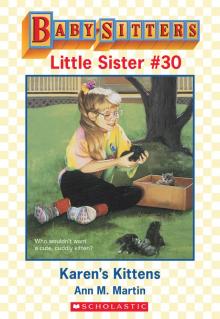 Karen's Kittens
Karen's Kittens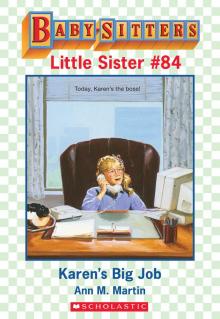 Karen's Big Job
Karen's Big Job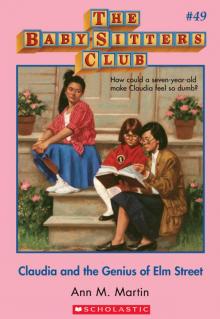 Claudia and the Genius of Elm Street
Claudia and the Genius of Elm Street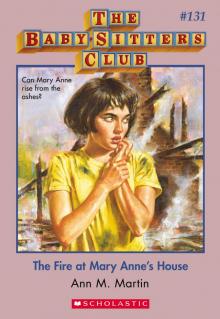 The Fire at Mary Anne's House
The Fire at Mary Anne's House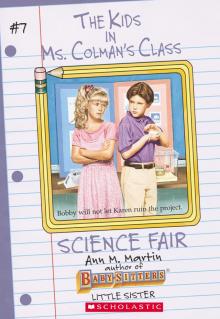 Science Fair
Science Fair Me and Katie (The Pest)
Me and Katie (The Pest)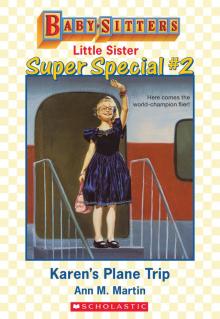 Karen's Plane Trip
Karen's Plane Trip Jessi's Wish
Jessi's Wish Dawn and Too Many Sitters
Dawn and Too Many Sitters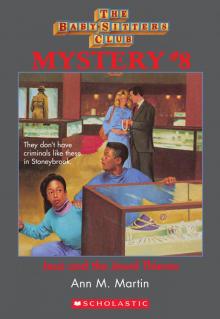 Jessi and the Jewel Thieves
Jessi and the Jewel Thieves Eleven Kids, One Summer
Eleven Kids, One Summer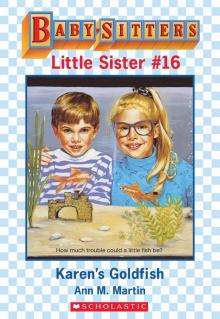 Karen's Goldfish
Karen's Goldfish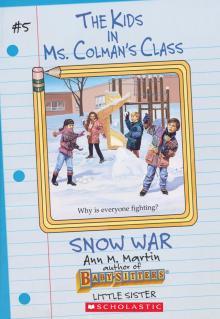 Snow War
Snow War Abby and the Secret Society
Abby and the Secret Society Keeping Secrets
Keeping Secrets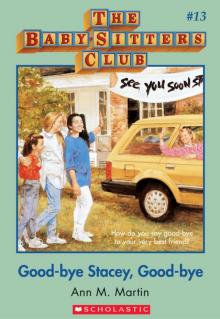 Good-Bye Stacey, Good-Bye
Good-Bye Stacey, Good-Bye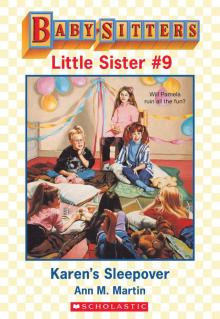 Karen's Sleepover
Karen's Sleepover Claudia and the World's Cutest Baby
Claudia and the World's Cutest Baby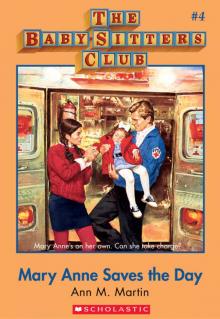 Mary Anne Saves the Day
Mary Anne Saves the Day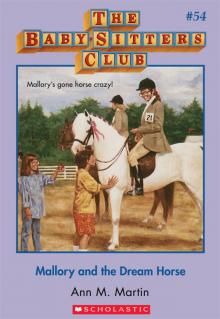 Mallory and the Dream Horse
Mallory and the Dream Horse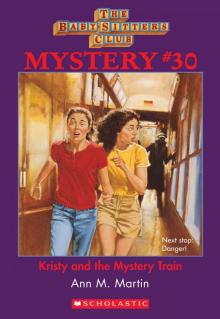 Kristy and the Mystery Train
Kristy and the Mystery Train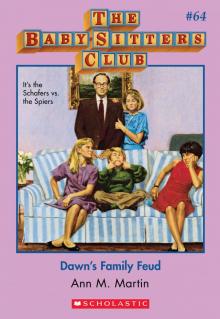 Dawn's Family Feud
Dawn's Family Feud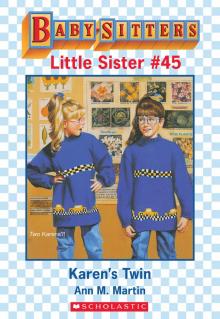 Karen's Twin
Karen's Twin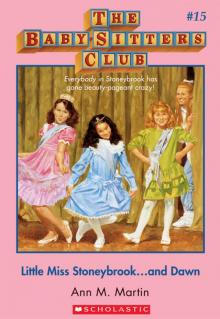 Little Miss Stoneybrook... And Dawn
Little Miss Stoneybrook... And Dawn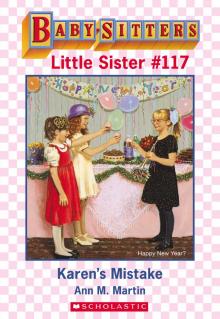 Karen's Mistake
Karen's Mistake Karen's Movie Star
Karen's Movie Star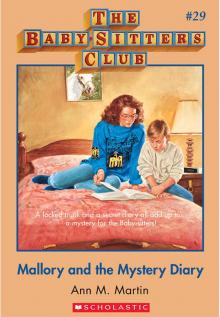 Mallory and the Mystery Diary
Mallory and the Mystery Diary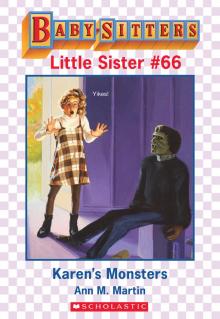 Karen's Monsters
Karen's Monsters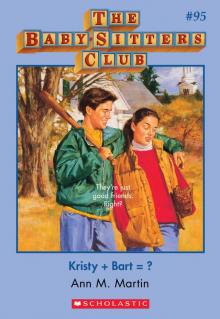 Kristy + Bart = ?
Kristy + Bart = ?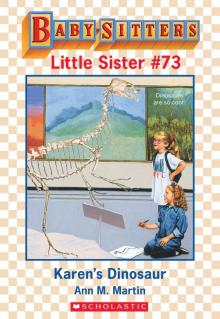 Karen's Dinosaur
Karen's Dinosaur Here Today
Here Today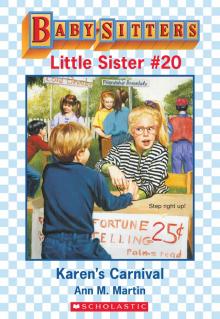 Karen's Carnival
Karen's Carnival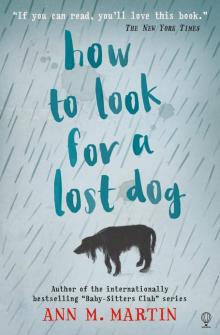 How to Look for a Lost Dog
How to Look for a Lost Dog Stacey vs. Claudia
Stacey vs. Claudia Stacey's Ex-Boyfriend
Stacey's Ex-Boyfriend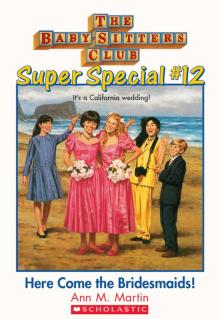 Here Come the Bridesmaids!
Here Come the Bridesmaids! Graduation Day
Graduation Day Kristy's Big News
Kristy's Big News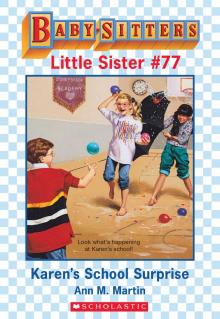 Karen's School Surprise
Karen's School Surprise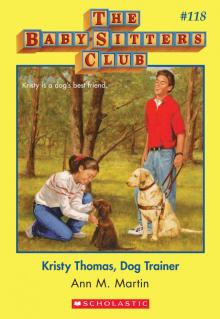 Kristy Thomas, Dog Trainer
Kristy Thomas, Dog Trainer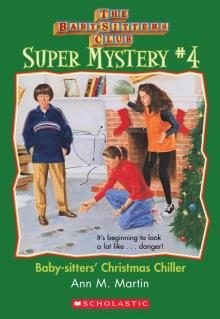 Baby-Sitters' Christmas Chiller
Baby-Sitters' Christmas Chiller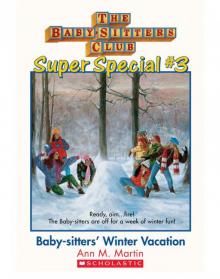 Baby-Sitters' Winter Vacation
Baby-Sitters' Winter Vacation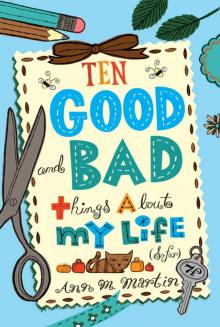 Ten Good and Bad Things About My Life
Ten Good and Bad Things About My Life Claudia and the Bad Joke
Claudia and the Bad Joke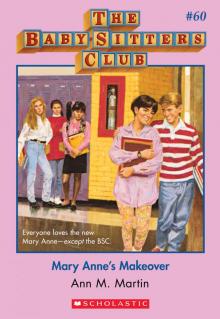 Mary Anne's Makeover
Mary Anne's Makeover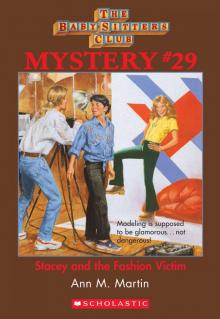 Stacey and the Fashion Victim
Stacey and the Fashion Victim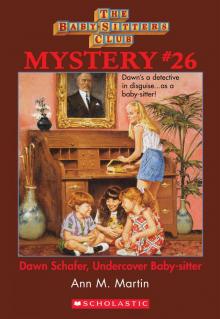 Dawn Schafer, Undercover Baby-Sitter
Dawn Schafer, Undercover Baby-Sitter Karen's Tuba
Karen's Tuba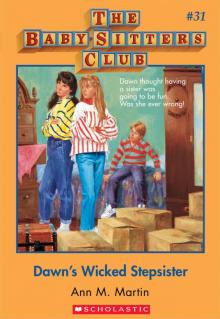 Dawn's Wicked Stepsister
Dawn's Wicked Stepsister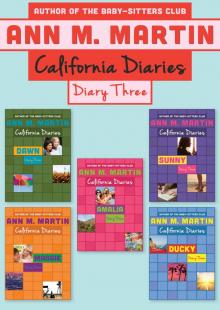 Diary Three: Dawn, Sunny, Maggie, Amalia, and Ducky
Diary Three: Dawn, Sunny, Maggie, Amalia, and Ducky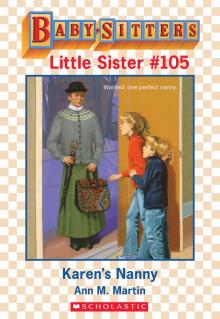 Karen's Nanny
Karen's Nanny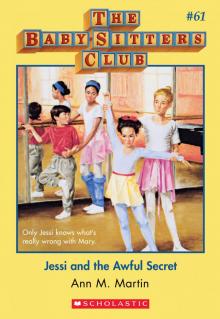 Jessi and the Awful Secret
Jessi and the Awful Secret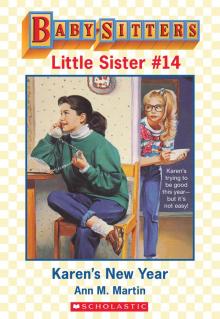 Karen's New Year
Karen's New Year Karen's Candy
Karen's Candy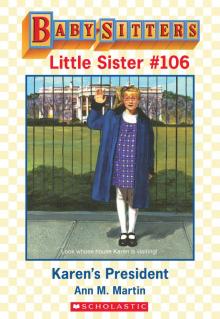 Karen's President
Karen's President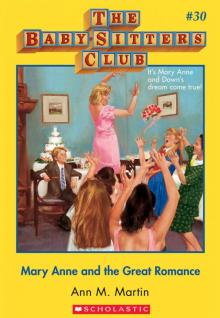 Mary Anne and the Great Romance
Mary Anne and the Great Romance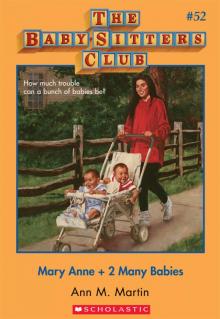 Mary Anne + 2 Many Babies
Mary Anne + 2 Many Babies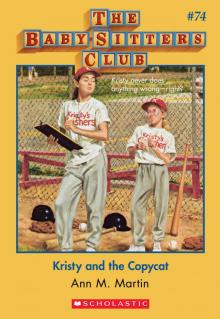 Kristy and the Copycat
Kristy and the Copycat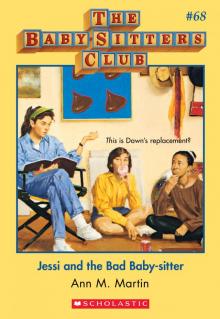 Jessi and the Bad Baby-Sitter
Jessi and the Bad Baby-Sitter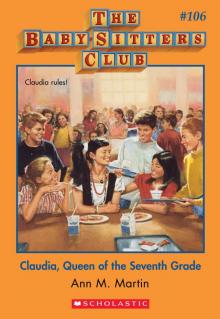 Claudia, Queen of the Seventh Grade
Claudia, Queen of the Seventh Grade Claudia and the Lighthouse Ghost
Claudia and the Lighthouse Ghost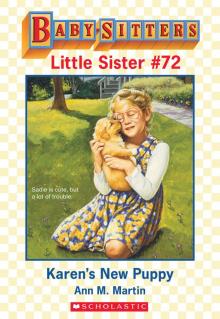 Karen's New Puppy
Karen's New Puppy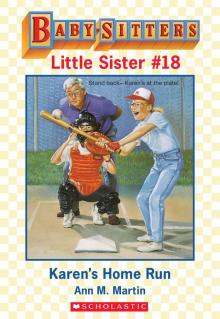 Karen's Home Run
Karen's Home Run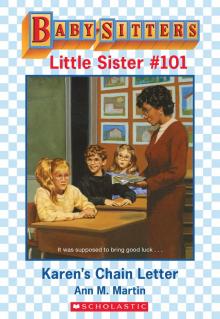 Karen's Chain Letter
Karen's Chain Letter Kristy in Charge
Kristy in Charge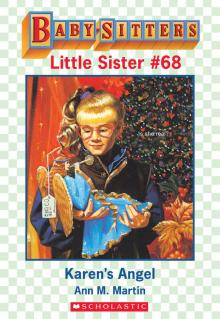 Karen's Angel
Karen's Angel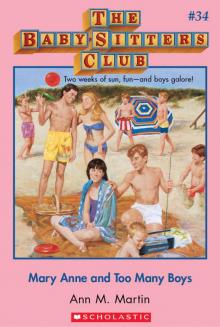 Mary Anne and Too Many Boys
Mary Anne and Too Many Boys Karen's Big Fight
Karen's Big Fight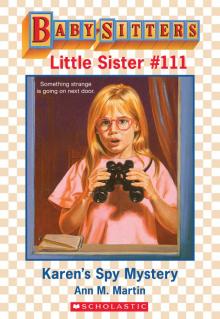 Karen's Spy Mystery
Karen's Spy Mystery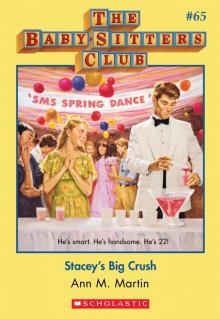 Stacey's Big Crush
Stacey's Big Crush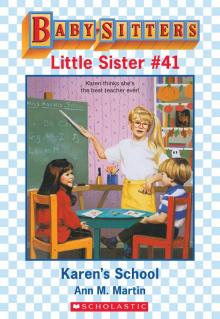 Karen's School
Karen's School Claudia and the Terrible Truth
Claudia and the Terrible Truth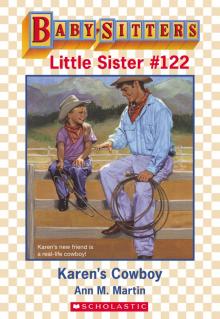 Karen's Cowboy
Karen's Cowboy The Summer Before
The Summer Before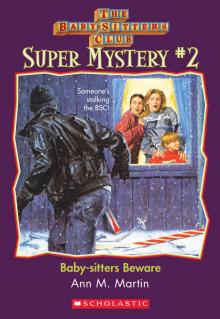 Beware, Dawn!
Beware, Dawn! Belle Teale
Belle Teale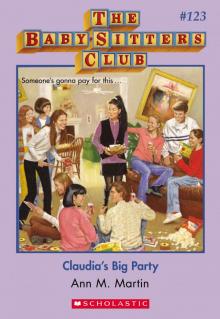 Claudia's Big Party
Claudia's Big Party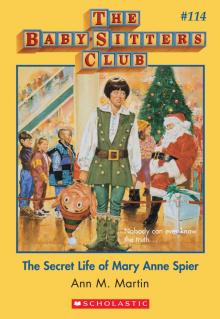 The Secret Life of Mary Anne Spier
The Secret Life of Mary Anne Spier Karen's Book
Karen's Book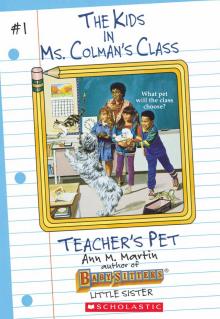 Teacher's Pet
Teacher's Pet Boy-Crazy Stacey
Boy-Crazy Stacey Claudia and the Disaster Date
Claudia and the Disaster Date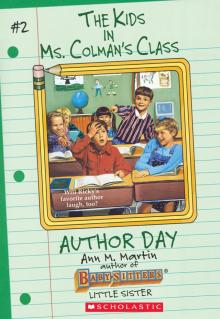 Author Day
Author Day Claudia and the Sad Good-Bye
Claudia and the Sad Good-Bye Kristy and the Worst Kid Ever
Kristy and the Worst Kid Ever Yours Turly, Shirley
Yours Turly, Shirley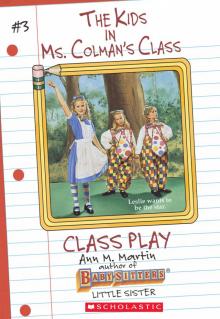 Class Play
Class Play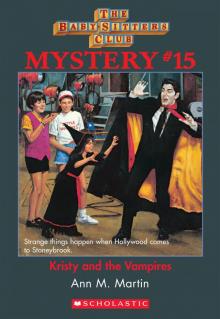 Kristy and the Vampires
Kristy and the Vampires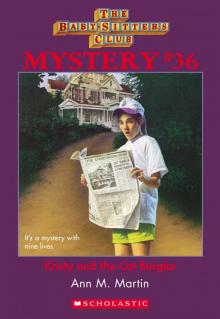 Kristy and the Cat Burglar
Kristy and the Cat Burglar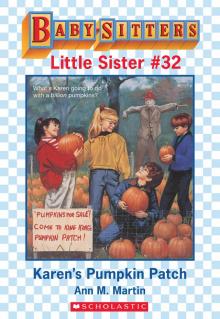 Karen's Pumpkin Patch
Karen's Pumpkin Patch Stacey and the Mystery at the Empty House
Stacey and the Mystery at the Empty House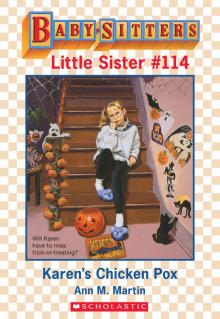 Karen's Chicken Pox
Karen's Chicken Pox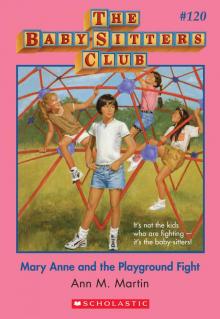 Mary Anne and the Playground Fight
Mary Anne and the Playground Fight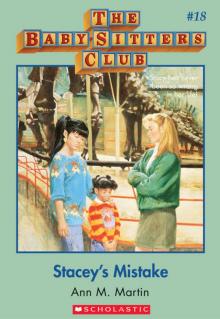 Stacey's Mistake
Stacey's Mistake Coming Apart
Coming Apart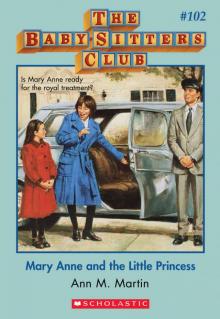 Mary Anne and the Little Princess
Mary Anne and the Little Princess Karen, Hannie and Nancy: The Three Musketeers
Karen, Hannie and Nancy: The Three Musketeers 'Tis the Season
'Tis the Season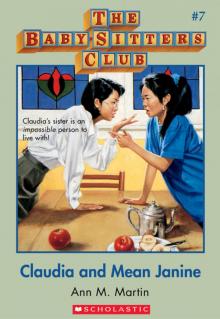 Claudia and Mean Janine
Claudia and Mean Janine Karen's School Bus
Karen's School Bus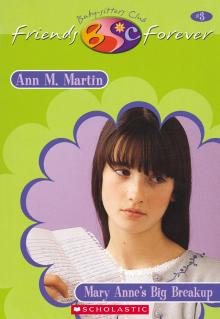 Mary Anne's Big Breakup
Mary Anne's Big Breakup Rain Reign
Rain Reign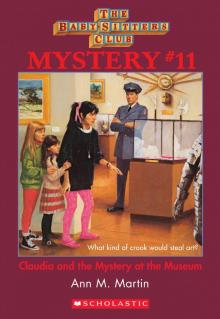 Claudia and the Mystery at the Museum
Claudia and the Mystery at the Museum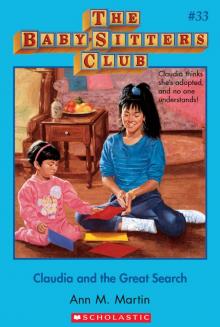 Claudia and the Great Search
Claudia and the Great Search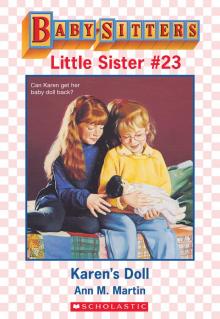 Karen's Doll
Karen's Doll Shannon's Story
Shannon's Story Sea City, Here We Come!
Sea City, Here We Come!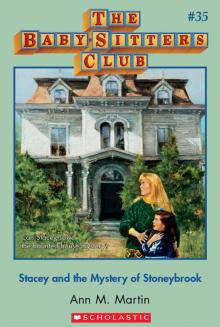 Stacey and the Mystery of Stoneybrook
Stacey and the Mystery of Stoneybrook Karen's Treasure
Karen's Treasure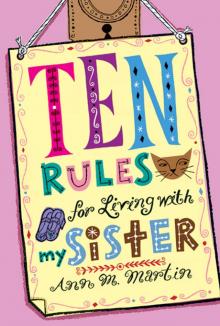 Ten Rules for Living With My Sister
Ten Rules for Living With My Sister With You and Without You
With You and Without You Baby-Sitters' Island Adventure
Baby-Sitters' Island Adventure Karen's Fishing Trip
Karen's Fishing Trip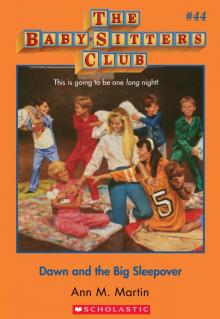 Dawn and the Big Sleepover
Dawn and the Big Sleepover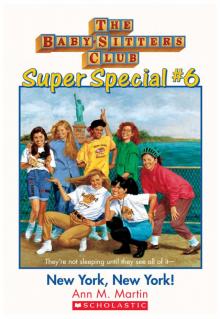 New York, New York!
New York, New York! Ten Kids, No Pets
Ten Kids, No Pets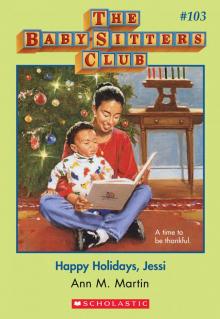 Happy Holidays, Jessi
Happy Holidays, Jessi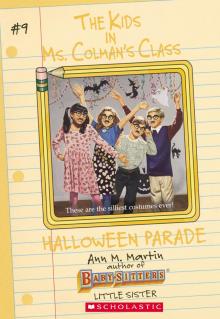 Halloween Parade
Halloween Parade Karen's New Holiday
Karen's New Holiday Kristy Power!
Kristy Power!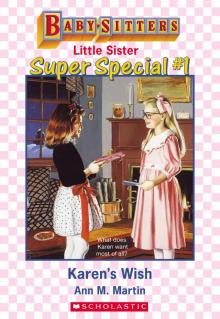 Karen's Wish
Karen's Wish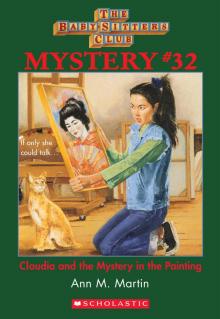 Claudia and the Mystery in the Painting
Claudia and the Mystery in the Painting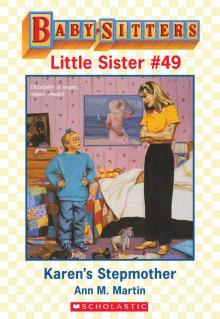 Karen's Stepmother
Karen's Stepmother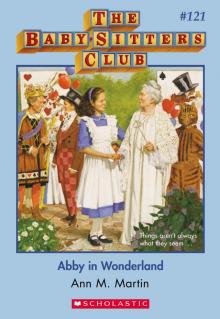 Abby in Wonderland
Abby in Wonderland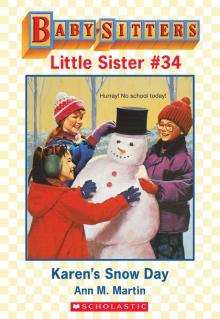 Karen's Snow Day
Karen's Snow Day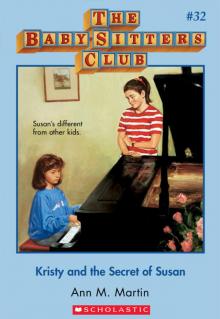 Kristy and the Secret of Susan
Kristy and the Secret of Susan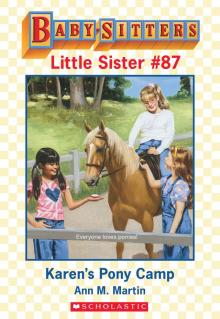 Karen's Pony Camp
Karen's Pony Camp Karen's School Trip
Karen's School Trip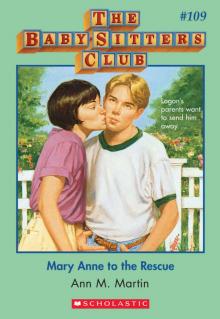 Mary Anne to the Rescue
Mary Anne to the Rescue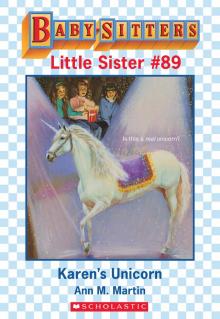 Karen's Unicorn
Karen's Unicorn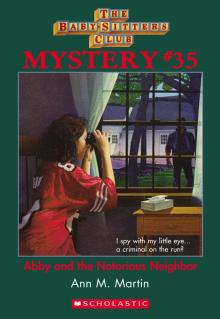 Abby and the Notorious Neighbor
Abby and the Notorious Neighbor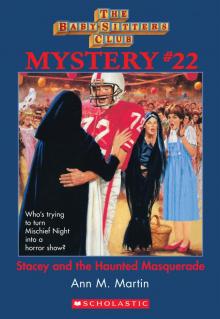 Stacey and the Haunted Masquerade
Stacey and the Haunted Masquerade Claudia Gets Her Guy
Claudia Gets Her Guy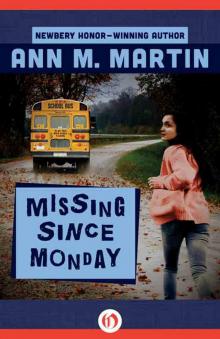 Missing Since Monday
Missing Since Monday Stacey's Choice
Stacey's Choice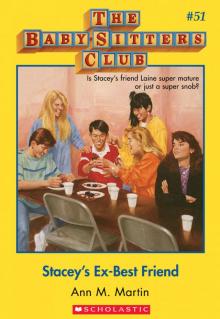 Stacey's Ex-Best Friend
Stacey's Ex-Best Friend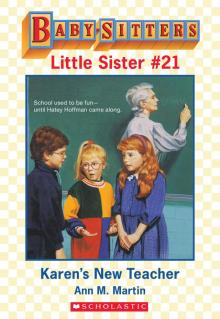 Karen's New Teacher
Karen's New Teacher Karen's Accident
Karen's Accident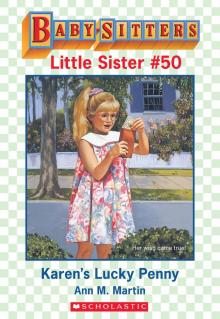 Karen's Lucky Penny
Karen's Lucky Penny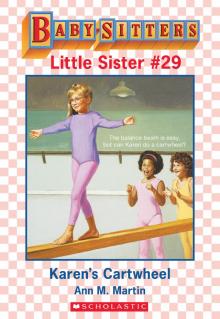 Karen's Cartwheel
Karen's Cartwheel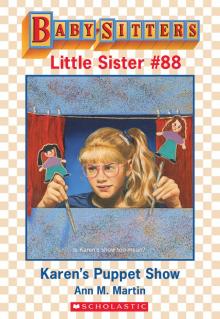 Karen's Puppet Show
Karen's Puppet Show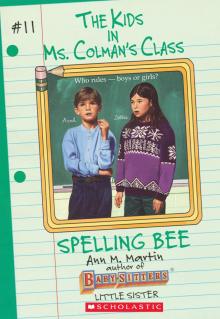 Spelling Bee
Spelling Bee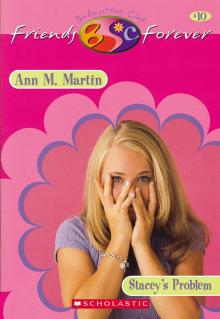 Stacey's Problem
Stacey's Problem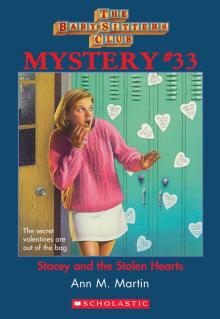 Stacey and the Stolen Hearts
Stacey and the Stolen Hearts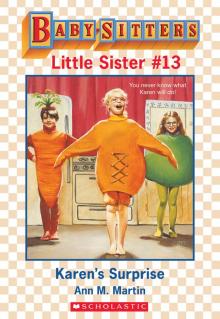 Karen's Surprise
Karen's Surprise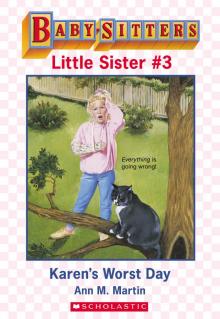 Karen's Worst Day
Karen's Worst Day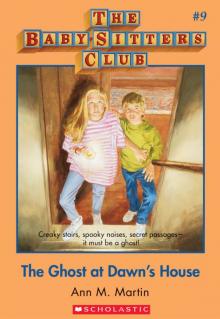 The Ghost at Dawn's House
The Ghost at Dawn's House Karen's Big Sister
Karen's Big Sister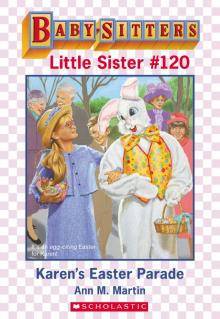 Karen's Easter Parade
Karen's Easter Parade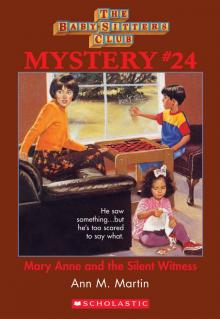 Mary Anne and the Silent Witness
Mary Anne and the Silent Witness Karen's Swim Meet
Karen's Swim Meet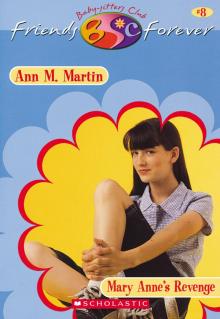 Mary Anne's Revenge
Mary Anne's Revenge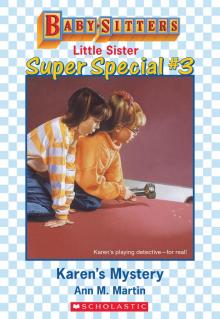 Karen's Mystery
Karen's Mystery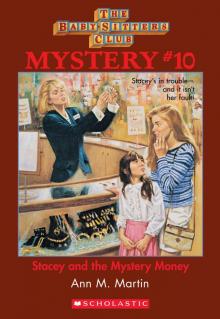 Stacey and the Mystery Money
Stacey and the Mystery Money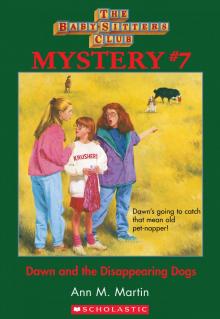 Dawn and the Disappearing Dogs
Dawn and the Disappearing Dogs Karen's Christmas Tree
Karen's Christmas Tree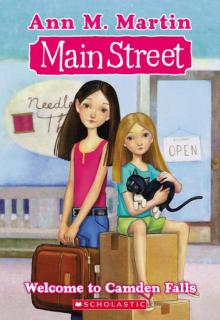 Welcome to Camden Falls
Welcome to Camden Falls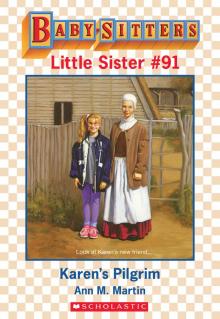 Karen's Pilgrim
Karen's Pilgrim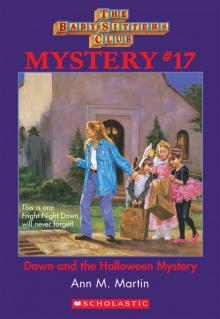 Dawn and the Halloween Mystery
Dawn and the Halloween Mystery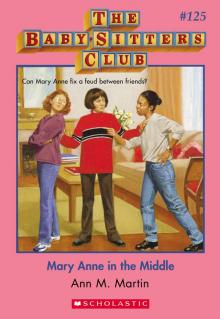 Mary Anne in the Middle
Mary Anne in the Middle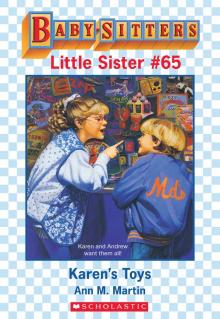 Karen's Toys
Karen's Toys Kristy's Great Idea
Kristy's Great Idea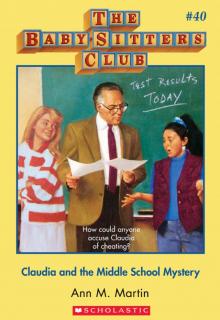 Claudia and the Middle School Mystery
Claudia and the Middle School Mystery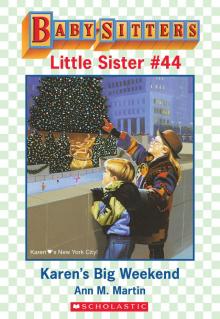 Karen's Big Weekend
Karen's Big Weekend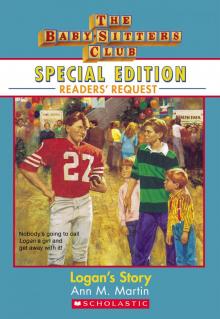 Logan's Story
Logan's Story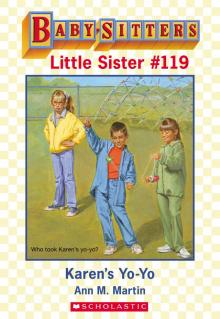 Karen's Yo-Yo
Karen's Yo-Yo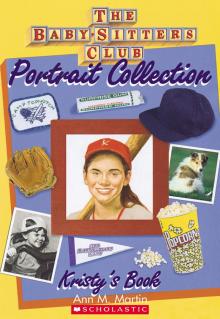 Kristy's Book
Kristy's Book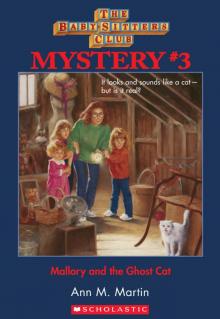 Mallory and the Ghost Cat
Mallory and the Ghost Cat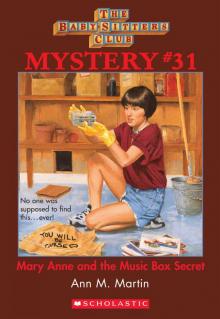 Mary Anne and the Music
Mary Anne and the Music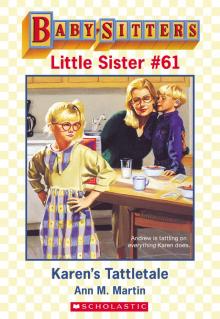 Karen's Tattletale
Karen's Tattletale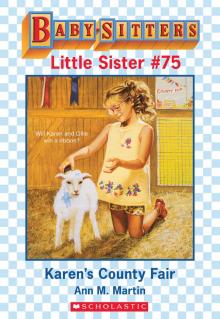 Karen's County Fair
Karen's County Fair Karen's Mermaid
Karen's Mermaid Snowbound
Snowbound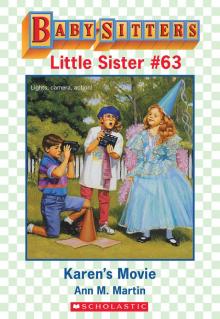 Karen's Movie
Karen's Movie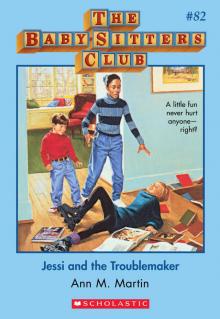 Jessi and the Troublemaker
Jessi and the Troublemaker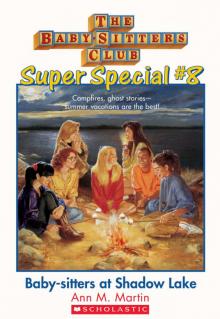 Baby-Sitters at Shadow Lake
Baby-Sitters at Shadow Lake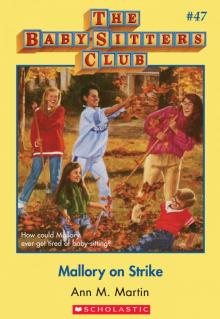 Mallory on Strike
Mallory on Strike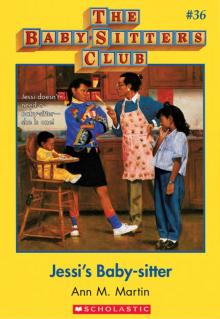 Jessi's Baby-Sitter
Jessi's Baby-Sitter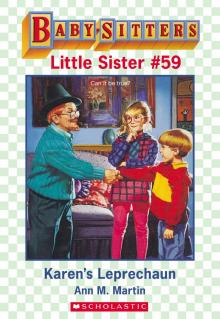 Karen's Leprechaun
Karen's Leprechaun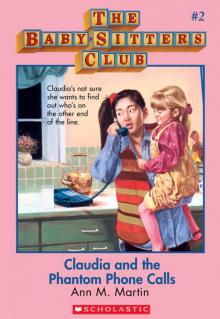 Claudia and the Phantom Phone Calls
Claudia and the Phantom Phone Calls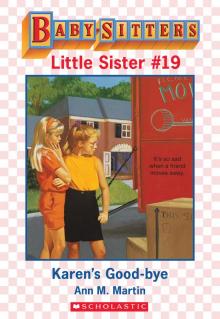 Karen's Good-Bye
Karen's Good-Bye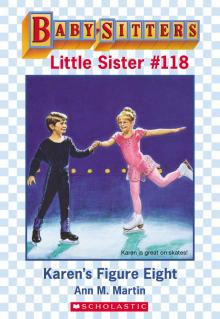 Karen's Figure Eight
Karen's Figure Eight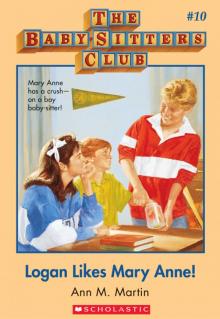 Logan Likes Mary Anne!
Logan Likes Mary Anne!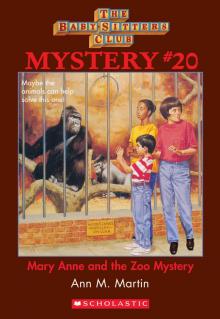 Mary Anne and the Zoo Mystery
Mary Anne and the Zoo Mystery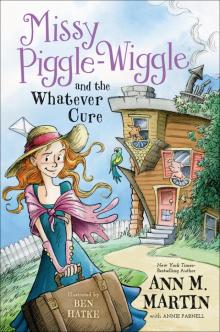 Missy Piggle-Wiggle and the Whatever Cure
Missy Piggle-Wiggle and the Whatever Cure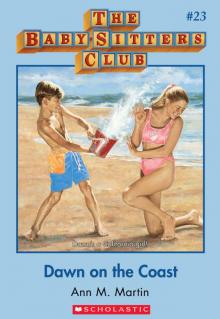 Dawn on the Coast
Dawn on the Coast Stacey and the Cheerleaders
Stacey and the Cheerleaders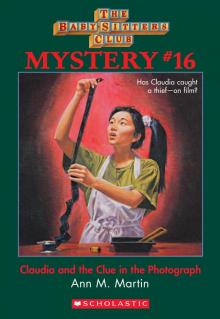 Claudia and the Clue in the Photograph
Claudia and the Clue in the Photograph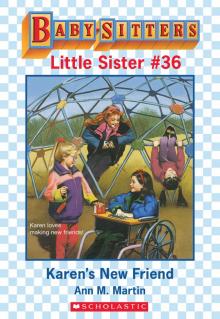 Karen's New Friend
Karen's New Friend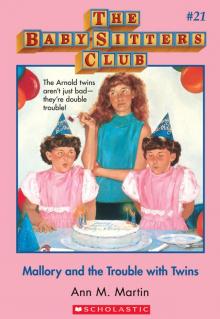 Mallory and the Trouble With Twins
Mallory and the Trouble With Twins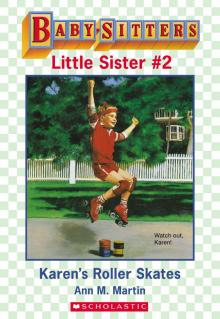 Karen's Roller Skates
Karen's Roller Skates Abby and the Best Kid Ever
Abby and the Best Kid Ever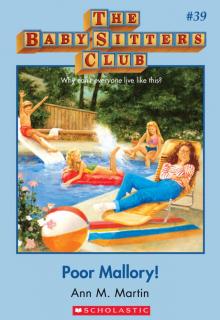 Poor Mallory!
Poor Mallory!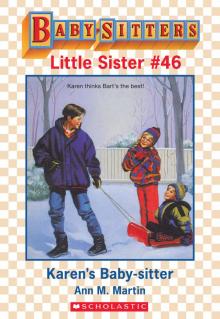 Karen's Witch
Karen's Witch Karen's Grandmothers
Karen's Grandmothers Slam Book
Slam Book Karen's School Picture
Karen's School Picture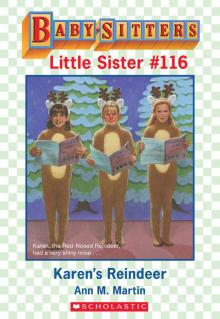 Karen's Reindeer
Karen's Reindeer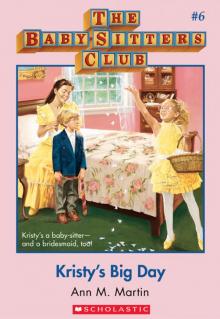 Kristy's Big Day
Kristy's Big Day The Long Way Home
The Long Way Home Karen's Sleigh Ride
Karen's Sleigh Ride On Christmas Eve
On Christmas Eve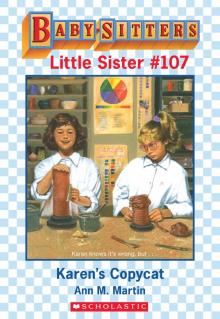 Karen's Copycat
Karen's Copycat Karen's Ice Skates
Karen's Ice Skates Claudia and the Little Liar
Claudia and the Little Liar Abby the Bad Sport
Abby the Bad Sport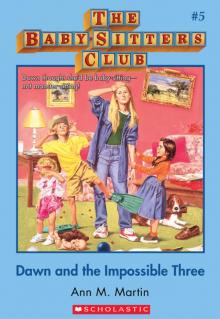 The Baby-Sitters Club #5: Dawn and the Impossible Three
The Baby-Sitters Club #5: Dawn and the Impossible Three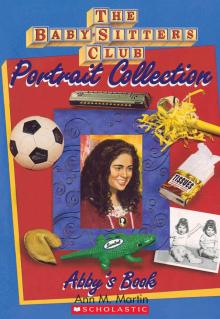 Abby's Book
Abby's Book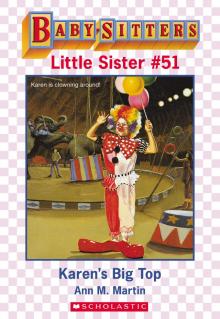 Karen's Big Top
Karen's Big Top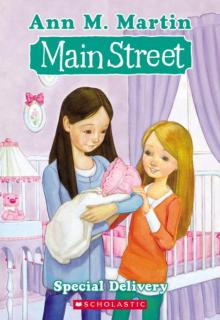 Main Street #8: Special Delivery
Main Street #8: Special Delivery Kristy and the Kidnapper
Kristy and the Kidnapper Karen's Ski Trip
Karen's Ski Trip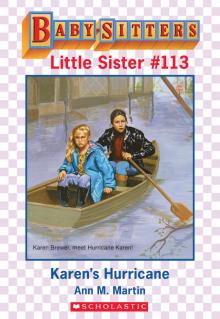 Karen's Hurricane
Karen's Hurricane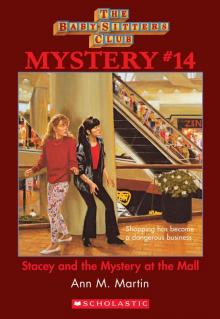 Stacey and the Mystery at the Mall
Stacey and the Mystery at the Mall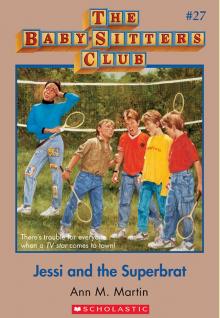 Jessi and the Superbrat
Jessi and the Superbrat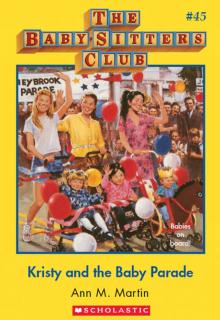 Kristy and the Baby Parade
Kristy and the Baby Parade Karen's New Bike
Karen's New Bike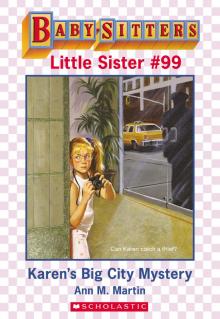 Karen's Big City Mystery
Karen's Big City Mystery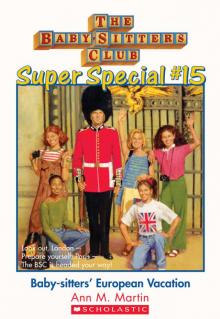 Baby-Sitters' European Vacation
Baby-Sitters' European Vacation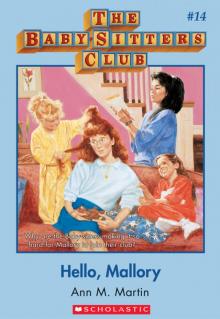 Hello, Mallory
Hello, Mallory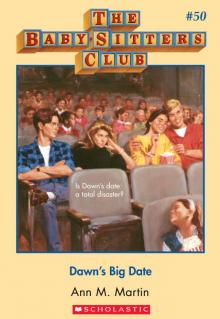 Dawn's Big Date
Dawn's Big Date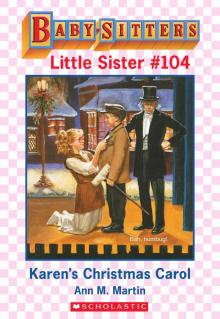 Karen's Christmas Carol
Karen's Christmas Carol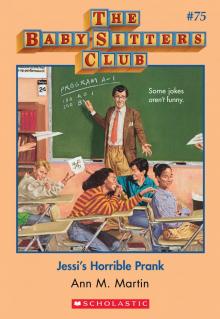 Jessi's Horrible Prank
Jessi's Horrible Prank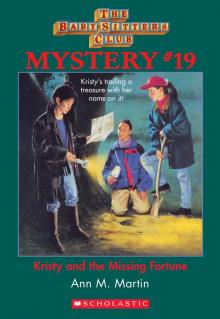 Kristy and the Missing Fortune
Kristy and the Missing Fortune Kristy and the Haunted Mansion
Kristy and the Haunted Mansion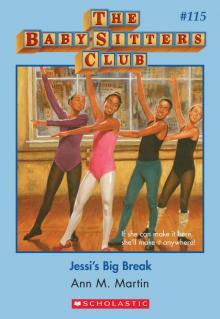 Jessi's Big Break
Jessi's Big Break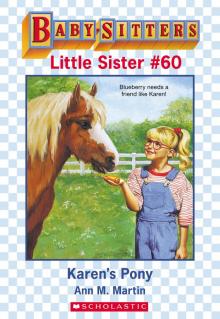 Karen's Pony
Karen's Pony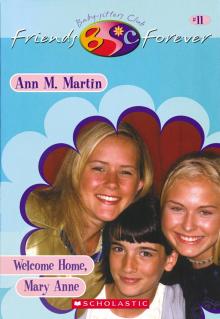 Welcome Home, Mary Anne
Welcome Home, Mary Anne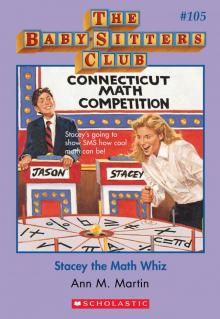 Stacey the Math Whiz
Stacey the Math Whiz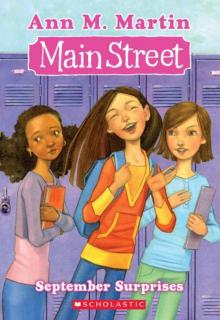 September Surprises
September Surprises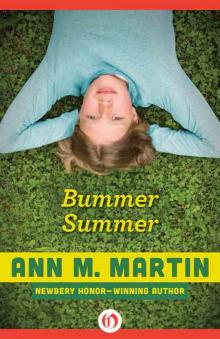 Bummer Summer
Bummer Summer Karen's Secret
Karen's Secret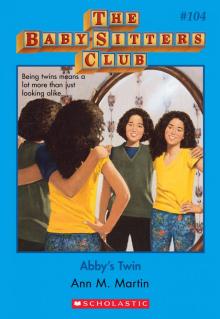 Abby's Twin
Abby's Twin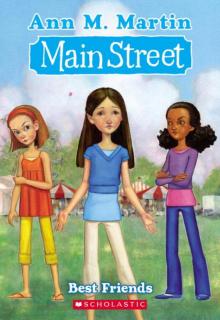 Main Street #4: Best Friends
Main Street #4: Best Friends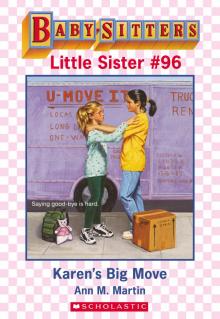 Karen's Big Move
Karen's Big Move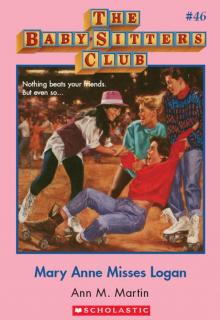 Mary Anne Misses Logan
Mary Anne Misses Logan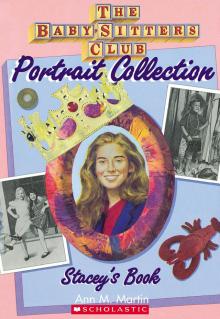 Stacey's Book
Stacey's Book Claudia and the Perfect Boy
Claudia and the Perfect Boy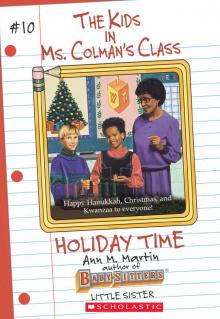 Holiday Time
Holiday Time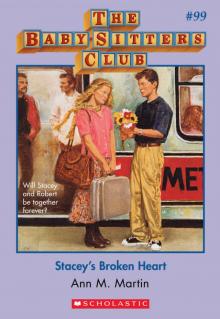 Stacey's Broken Heart
Stacey's Broken Heart Karen's Field Day
Karen's Field Day Kristy's Worst Idea
Kristy's Worst Idea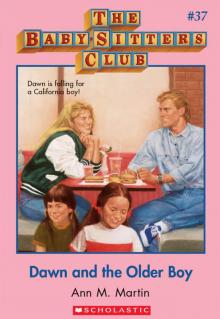 Dawn and the Older Boy
Dawn and the Older Boy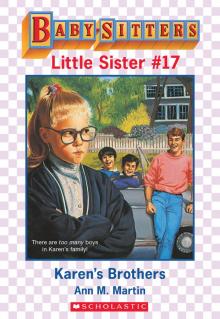 Karen's Brothers
Karen's Brothers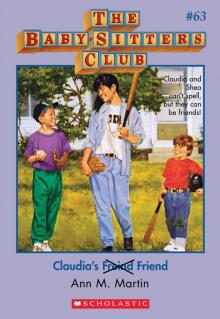 Claudia's Friend
Claudia's Friend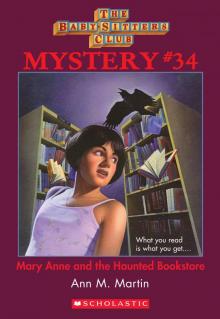 Mary Anne and the Haunted Bookstore
Mary Anne and the Haunted Bookstore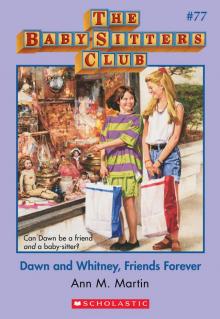 Dawn and Whitney, Friends Forever
Dawn and Whitney, Friends Forever Summer School
Summer School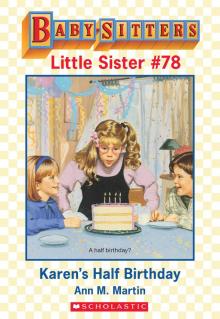 Karen's Birthday
Karen's Birthday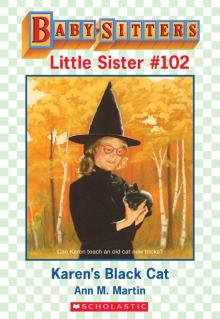 Karen's Black Cat
Karen's Black Cat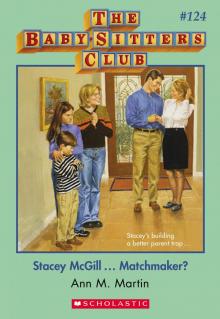 Stacey McGill... Matchmaker?
Stacey McGill... Matchmaker? Claudia's Book
Claudia's Book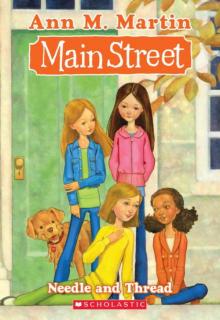 Main Street #2: Needle and Thread
Main Street #2: Needle and Thread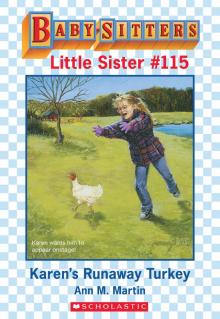 Karen's Runaway Turkey
Karen's Runaway Turkey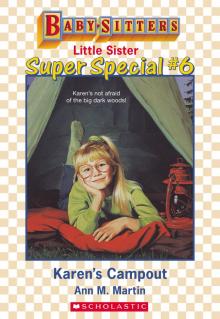 Karen's Campout
Karen's Campout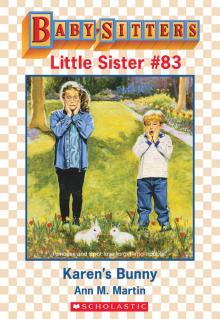 Karen's Bunny
Karen's Bunny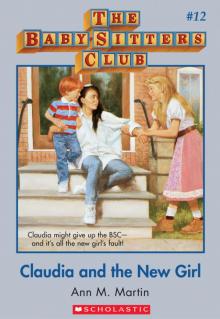 Claudia and the New Girl
Claudia and the New Girl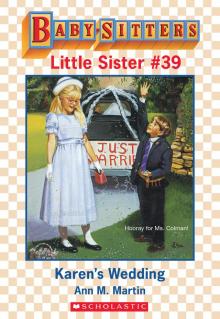 Karen's Wedding
Karen's Wedding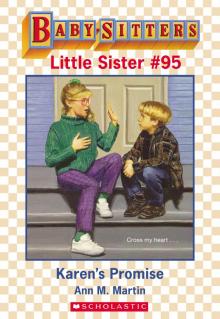 Karen's Promise
Karen's Promise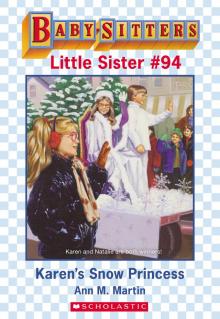 Karen's Snow Princess
Karen's Snow Princess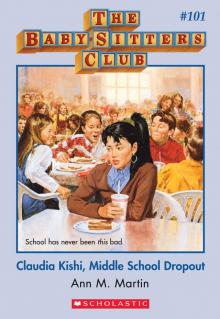 Claudia Kishi, Middle School Dropout
Claudia Kishi, Middle School Dropout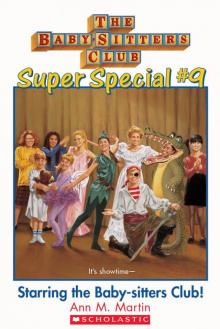 Starring the Baby-Sitters Club!
Starring the Baby-Sitters Club!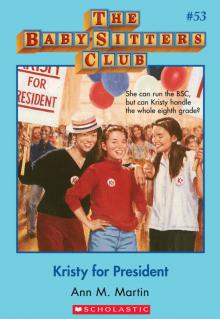 Kristy for President
Kristy for President California Girls!
California Girls!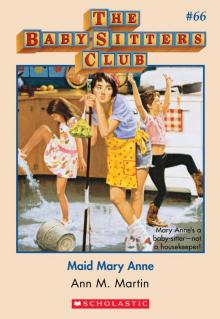 Maid Mary Anne
Maid Mary Anne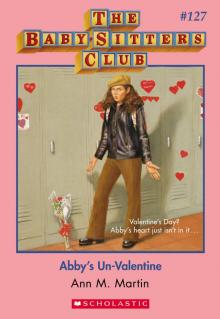 Abby's Un-Valentine
Abby's Un-Valentine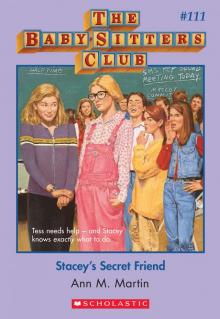 Stacey's Secret Friend
Stacey's Secret Friend Karen's Haunted House
Karen's Haunted House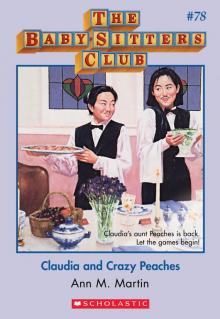 Claudia and Crazy Peaches
Claudia and Crazy Peaches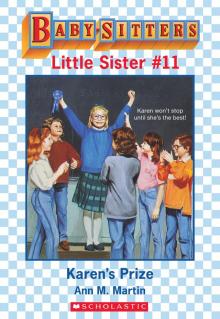 Karen's Prize
Karen's Prize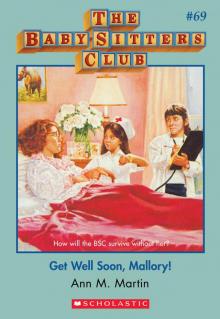 Get Well Soon, Mallory!
Get Well Soon, Mallory!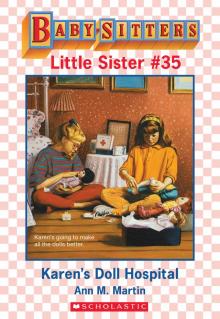 Karen's Doll Hospital
Karen's Doll Hospital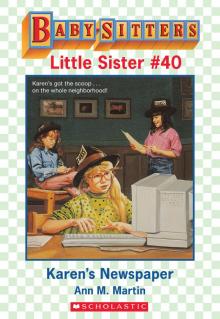 Karen's Newspaper
Karen's Newspaper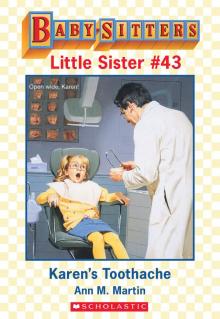 Karen's Toothache
Karen's Toothache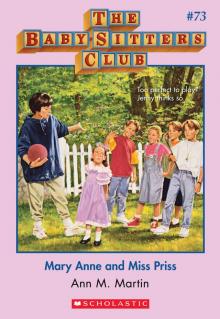 Mary Anne and Miss Priss
Mary Anne and Miss Priss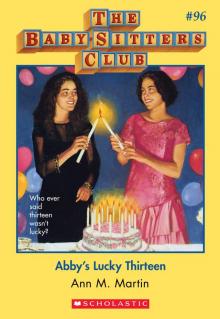 Abby's Lucky Thirteen
Abby's Lucky Thirteen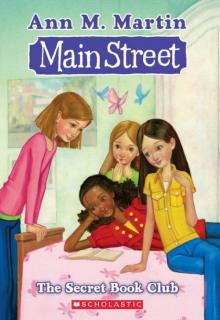 The Secret Book Club
The Secret Book Club The All-New Mallory Pike
The All-New Mallory Pike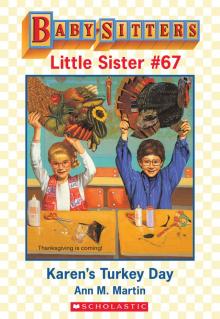 Karen's Turkey Day
Karen's Turkey Day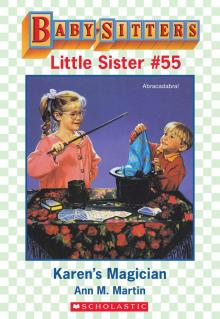 Karen's Magician
Karen's Magician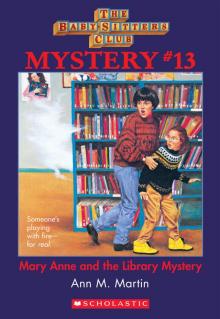 Mary Anne and the Library Mystery
Mary Anne and the Library Mystery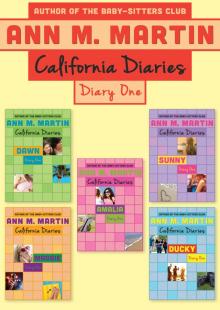 Diary One: Dawn, Sunny, Maggie, Amalia, and Ducky
Diary One: Dawn, Sunny, Maggie, Amalia, and Ducky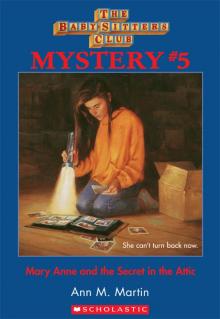 Mary Anne and the Secret in the Attic
Mary Anne and the Secret in the Attic Kristy and the Mother's Day Surprise
Kristy and the Mother's Day Surprise Karen's in Love
Karen's in Love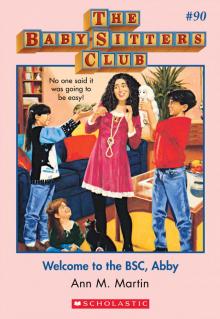 Welcome to the BSC, Abby
Welcome to the BSC, Abby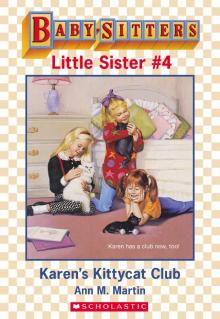 Karen's Kittycat Club
Karen's Kittycat Club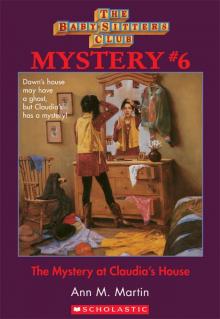 The Mystery at Claudia's House
The Mystery at Claudia's House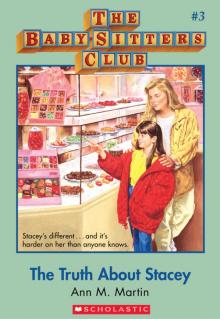 The Truth About Stacey
The Truth About Stacey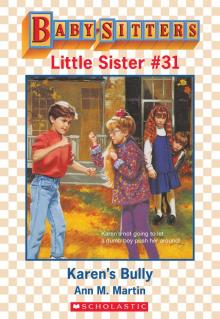 Karen's Bully
Karen's Bully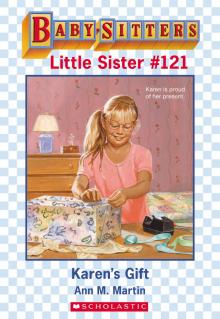 Karen's Gift
Karen's Gift BSC in the USA
BSC in the USA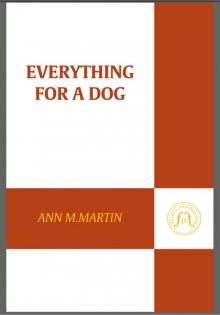 Everything for a Dog
Everything for a Dog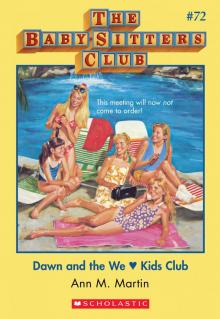 Dawn and the We Love Kids Club
Dawn and the We Love Kids Club Karen's Ghost
Karen's Ghost Stacey's Lie
Stacey's Lie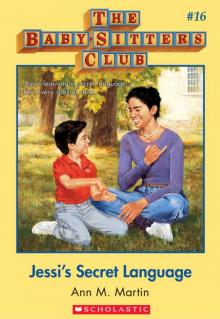 Jessi's Secret Language
Jessi's Secret Language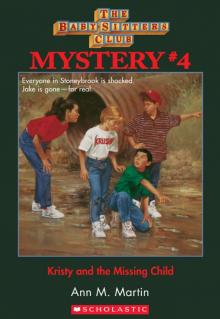 Kristy and the Missing Child
Kristy and the Missing Child Better to Wish
Better to Wish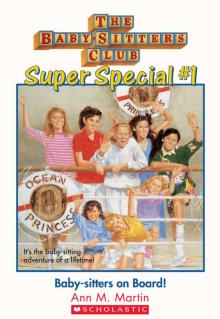 Baby-Sitters on Board!
Baby-Sitters on Board!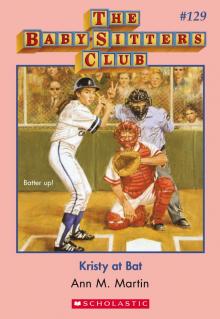 Kristy at Bat
Kristy at Bat Everything Changes
Everything Changes Don't Give Up, Mallory
Don't Give Up, Mallory A Dog's Life: The Autobiography of a Stray
A Dog's Life: The Autobiography of a Stray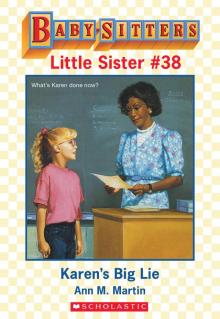 Karen's Big Lie
Karen's Big Lie Karen's Show and Share
Karen's Show and Share Mallory Hates Boys (and Gym)
Mallory Hates Boys (and Gym)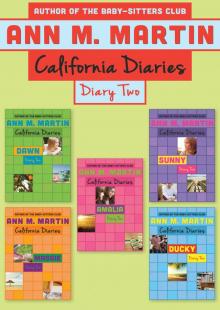 Diary Two: Dawn, Sunny, Maggie, Amalia, and Ducky
Diary Two: Dawn, Sunny, Maggie, Amalia, and Ducky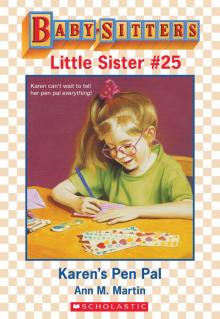 Karen's Pen Pal
Karen's Pen Pal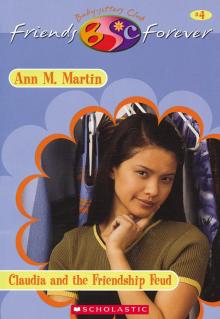 Claudia and the Friendship Feud
Claudia and the Friendship Feud Karen's Secret Valentine
Karen's Secret Valentine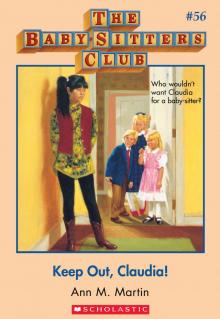 Keep Out, Claudia!
Keep Out, Claudia! Aloha, Baby-Sitters!
Aloha, Baby-Sitters!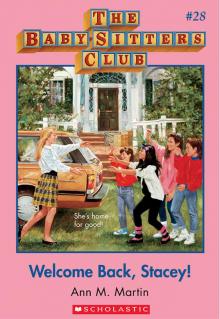 Welcome Back, Stacey
Welcome Back, Stacey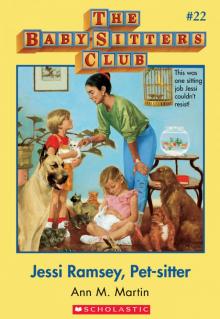 Jessi Ramsey, Pet-Sitter
Jessi Ramsey, Pet-Sitter Karen's Pizza Party
Karen's Pizza Party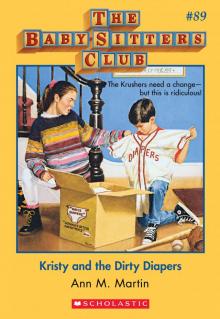 Kristy and the Dirty Diapers
Kristy and the Dirty Diapers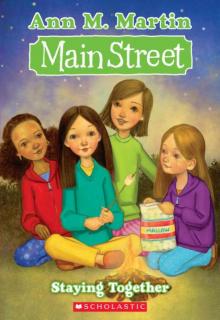 Staying Together
Staying Together Dawn and the Surfer Ghost
Dawn and the Surfer Ghost Claudia Makes Up Her Mind
Claudia Makes Up Her Mind Jessi's Gold Medal
Jessi's Gold Medal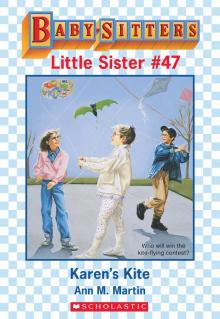 Karen's Kite
Karen's Kite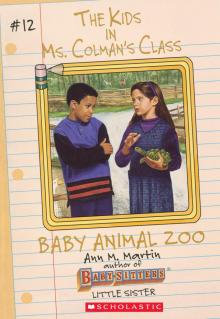 Baby Animal Zoo
Baby Animal Zoo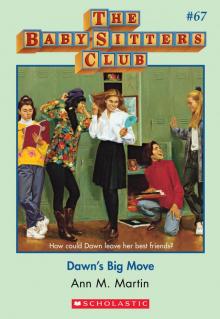 Dawn's Big Move
Dawn's Big Move Karen's Big Joke
Karen's Big Joke Karen's Lemonade Stand
Karen's Lemonade Stand Ma and Pa Dracula
Ma and Pa Dracula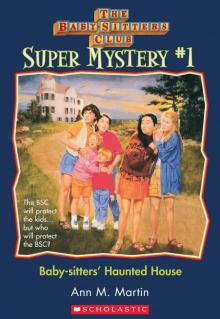 Baby-Sitters' Haunted House
Baby-Sitters' Haunted House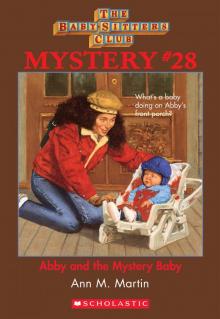 Abby and the Mystery Baby
Abby and the Mystery Baby Home Is the Place
Home Is the Place Karen's Grandad
Karen's Grandad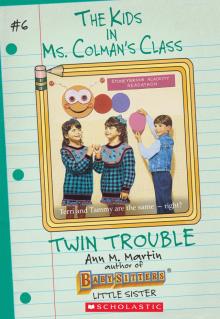 Twin Trouble
Twin Trouble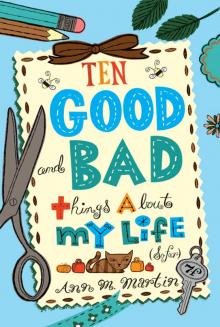 Ten Good and Bad Things About My Life (So Far)
Ten Good and Bad Things About My Life (So Far)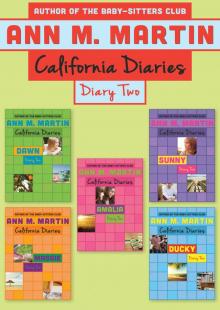 Diary Two
Diary Two Baby-Sitters Club 027
Baby-Sitters Club 027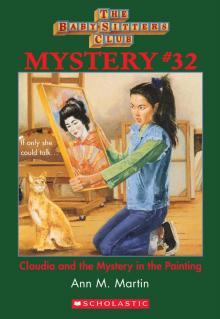 Claudia and the Mystery Painting
Claudia and the Mystery Painting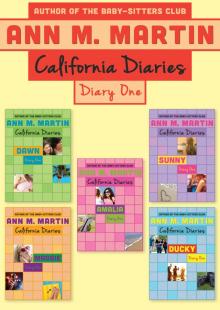 Diary One
Diary One Baby-Sitters Club 037
Baby-Sitters Club 037 Baby-Sitters Club 028
Baby-Sitters Club 028 Baby-Sitters Club 085
Baby-Sitters Club 085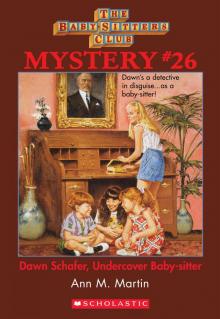 Dawn Schaffer Undercover Baby-Sitter
Dawn Schaffer Undercover Baby-Sitter Jessi's Babysitter
Jessi's Babysitter The Baby-Sitters Club #110: Abby the Bad Sport (Baby-Sitters Club, The)
The Baby-Sitters Club #110: Abby the Bad Sport (Baby-Sitters Club, The) Karen's Little Sister
Karen's Little Sister Baby-Sitters Club 058
Baby-Sitters Club 058 Claudia And The Genius On Elm St.
Claudia And The Genius On Elm St. Missy Piggle-Wiggle and the Sticky-Fingers Cure
Missy Piggle-Wiggle and the Sticky-Fingers Cure Kristy and Kidnapper
Kristy and Kidnapper Baby-Sitters Club 041
Baby-Sitters Club 041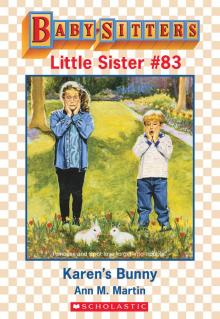 Karen's Bunny Trouble
Karen's Bunny Trouble Baby-Sitters Club 032
Baby-Sitters Club 032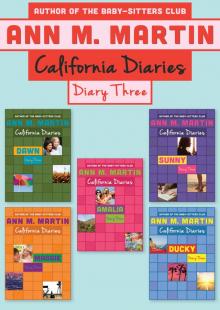 Diary Three
Diary Three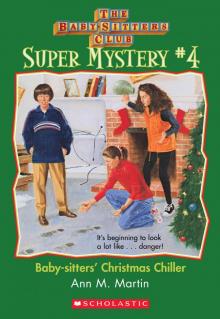 Christmas Chiller
Christmas Chiller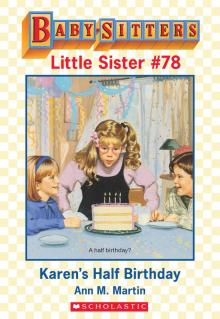 Karen's Half-Birthday
Karen's Half-Birthday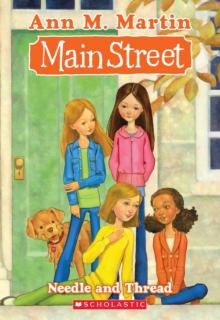 Needle and Thread
Needle and Thread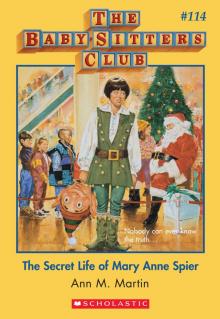 Secret Life of Mary Anne Spier
Secret Life of Mary Anne Spier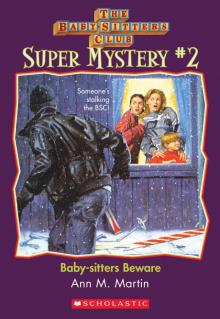 Baby-Sitters Beware
Baby-Sitters Beware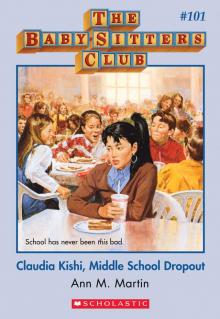 Claudia Kishi, Middle School Drop-Out
Claudia Kishi, Middle School Drop-Out Logan Likes Mary Anne !
Logan Likes Mary Anne ! Baby-Sitters Club 061
Baby-Sitters Club 061 Best Friends
Best Friends Baby-Sitters Club 031
Baby-Sitters Club 031 Karen's Little Witch
Karen's Little Witch Jessi Ramsey, Petsitter
Jessi Ramsey, Petsitter Baby-Sitters Club 123
Baby-Sitters Club 123 Baby-Sitters Club 059
Baby-Sitters Club 059 Baby-Sitters Club 033
Baby-Sitters Club 033 Baby-Sitters Club 060
Baby-Sitters Club 060 Baby-Sitters Club 094
Baby-Sitters Club 094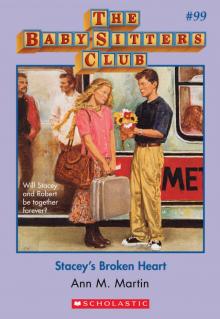 The Baby-Sitters Club #99: Stacey's Broken Heart
The Baby-Sitters Club #99: Stacey's Broken Heart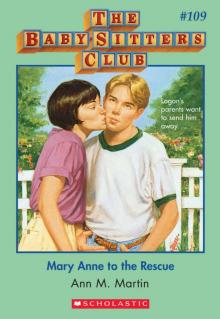 The Baby-Sitters Club #109: Mary Anne to the Rescue (Baby-Sitters Club, The)
The Baby-Sitters Club #109: Mary Anne to the Rescue (Baby-Sitters Club, The) Mystery At Claudia's House
Mystery At Claudia's House Claudia And The Sad Goodbye
Claudia And The Sad Goodbye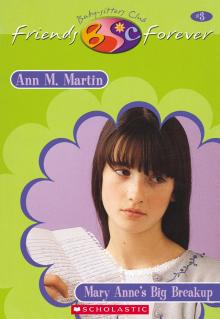 Mary Anne's Big Break-Up
Mary Anne's Big Break-Up Baby-Sitters Club 025
Baby-Sitters Club 025 Baby-Sitters Club 042
Baby-Sitters Club 042 Stacey and the Mystery of the Empty House
Stacey and the Mystery of the Empty House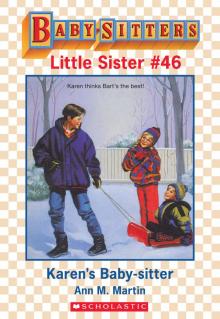 Karen's Baby-Sitter
Karen's Baby-Sitter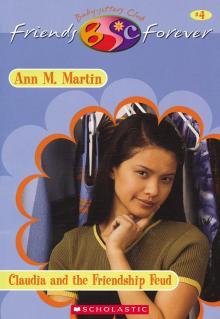 Claudia's Friendship Feud
Claudia's Friendship Feud Baby-Sitters Club 090
Baby-Sitters Club 090 Baby-Sitters Club 021
Baby-Sitters Club 021 Baby-Sitters Club 056
Baby-Sitters Club 056 Baby-Sitters Club 040
Baby-Sitters Club 040 The Baby-Sitters Club #108: Don't Give Up, Mallory (Baby-Sitters Club, The)
The Baby-Sitters Club #108: Don't Give Up, Mallory (Baby-Sitters Club, The)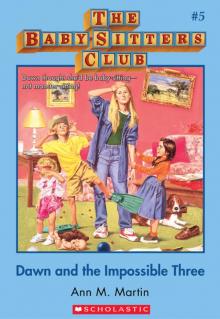 Dawn and the Impossible Three
Dawn and the Impossible Three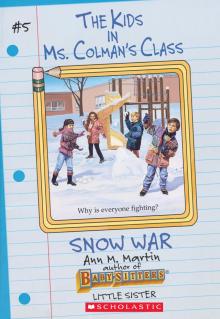 The Snow War
The Snow War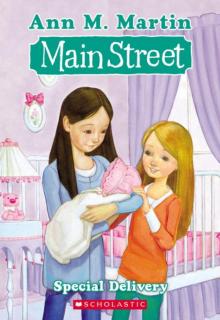 Special Delivery
Special Delivery Baby-Sitters Club 057
Baby-Sitters Club 057 Mary Anne And Too Many Babies
Mary Anne And Too Many Babies Baby-Sitters Club 030
Baby-Sitters Club 030